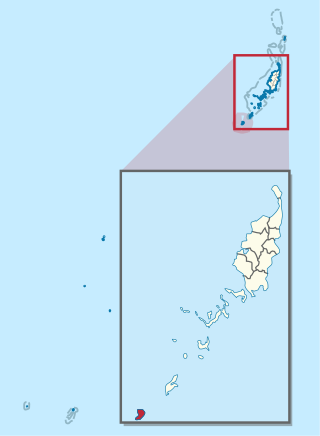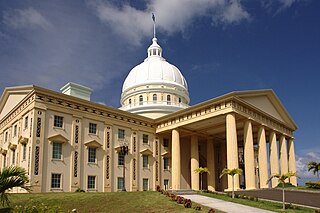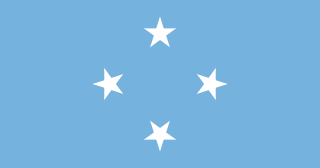
Palau, officially the Republic of Palau, is an island country in the Micronesia subregion of Oceania in the western Pacific. The republic consists of approximately 340 islands and connects the western chain of the Caroline Islands with parts of the Federated States of Micronesia.

Palau was initially settled around 1000 BC.

Koror is the state comprising the main commercial centre of the Republic of Palau. It consists of several islands, the most prominent being Koror Island. It is Palau’s most populous state.

Angaur, or Ngeaur in Palauan, is an island and state in the island nation of Palau.
The Micronesians or Micronesian peoples are various closely related ethnic groups native to Micronesia, a region of Oceania in the Pacific Ocean. They are a part of the Austronesian ethnolinguistic group, which has an Urheimat in Taiwan.

Haruo Ignacio Remeliik was the first President of Palau from 2 March 1981 until his assassination on 30 June 1985. He is buried at Kloulklubed in his home state of Peleliu. Remeliik was of mixed Japanese and Palauan descent.

Roman Tmetuchl was a Palauan political leader and businessman. He grew up in Japanese-controlled Palau and joined the Kempeitai, the Japanese secret police, during World War II. After the war, he became the leader of Palau's Liberal Party. He worked in the Congress of the Trust Territory of the Pacific Islands from 1964 to 1978 and advocated for Palau gaining a separate status from the rest of Micronesia. He became governor of Airai and engaged in three unsuccessful Palauan presidential campaigns. As a businessman, Tmetuchl led several construction projects for his business holdings and for the Palauan community, including the Palau International Airport and a Seventh-Day Adventist clinic.

The Belau National Museum (BNM), previously Palau Museum, is a museum in Koror, Palau. It is the oldest continuously run museum in Micronesia.

Belau Air, Inc. is a Palauan airline with its headquarters in Koror City. Belau Air is the only air carrier operating solely throughout the island nation of Palau, having its hub at Roman Tmetuchl International Airport in the state of Airai nearby the country's main city and former capital Koror. Belau Air currently owns only one small plane, a modified Cessna 206, which can hold up to five passengers. The service makes daily flights to the Palauan states of Peleliu and Angaur, both of which are small island communities southwest of the State of Koror. The plane is also used for tourism and offers tours throughout Palau's Rock Islands. The airline does not travel internationally, and other airlines are used to travel into and out of Palau. The Airline provides a Shuttle Service to transport passengers from the Roman Tmetuchl International Airport in Airai to Koror.

Ngerulmud is the seat of government of the Republic of Palau, an island nation in the Pacific Ocean. It replaced Koror City as a capital in 2006. The settlement is located in the state of Melekeok on Babeldaob, the country's largest island, located 20 kilometers northeast of Koror City and 2 km northwest of Melekeok City. It is the least-populous capital city of a sovereign nation in the world.
There is a small Japanese community in the Pacific Island country of Palau, which mainly consists of Japanese expatriates residing in Palau over a long-term basis. A few Japanese expatriates started to reside in Palau after it gained independence in 1994, and established long-term businesses in the country. Japanese settlement in Palau dates back to the early 19th century, although large scale Japanese migration to Palau did not occur until the 1920s, when Palau came under Japanese rule and administered as part of the South Seas Mandate. Japanese settlers took on leading administrative roles in the Japanese colonial government, and developed Palau's economy. After the Japanese surrender in 1945, virtually all of the Japanese population was repatriated back to Japan, although people of mixed Japanese-Palauan descent were allowed to remain behind. People of Japanese-Palauan descent constitute a large minority of Palau's population as a result of substantial intermarriage between the Japanese settlers and Palauans. They generally identify with, conforming to cultural norms and daily lives with the Palauans.

Japanese Micronesians, also Nikkei Micronesians or Micronesians of Japanese descent, refers to citizens of the Federated States of Micronesia (FSM) who are of Japanese descent and are members of the Japanese global diaspora known as the Nikkei (日系).
Large-scale Japanese settlement in Micronesia occurred in the first half of the 20th century when Imperial Japan colonised much of Micronesia.
Japanese settlement in the Marshall Islands was spurred on by Japanese trade in the Pacific region. The first Japanese explorers arrived in the Marshall Islands in the late 19th century, although permanent settlements were not established until the 1920s. As compared to other Micronesian islands in the South Seas Mandate, there were fewer Japanese who settled in the islands. After the Japanese surrender in 1945, the Japanese populace were repatriated to Japan, although people of mixed Japanese–Marshallese heritage remained behind. They form a sizeable minority in the Marshall Islands' populace, and are well represented in the corporate, public and political sectors in the country.
The sport of baseball is widely played in Palau, having been introduced by the Japanese during their occupation of the island nation. The highest level of league play in Palau in represented by Palau Major League (PML), which is overseen by the Belau Baseball Federation. The country is represented in international play by the Palau national baseball team.

Diplomatic relations are maintained between Japan and Palau, a small island country in the western Pacific Ocean that was once a Japanese colony. There is a Japanese embassy on the Palauan island of Koror and a Palauan embassy in Tokyo.

Koror City is the largest city and the commercial center in Palau, home to about half of the country's population, located on Koror Island. During the interwar period it served as the capital of the South Seas Mandate, a group of islands that made up the League of Nations mandated territory held by the Empire of Japan. It was subsequently the capital of Palau until it was replaced by Ngerulmud in 2006.

Yutaka Miller Gibbons was the ibedul of Koror from 1973 until his death in 2021. He was also an anti–nuclear weapons activist and political candidate.

John Obeldabl Ngiraked (1932–2003) was a Palauan politician and criminal.















